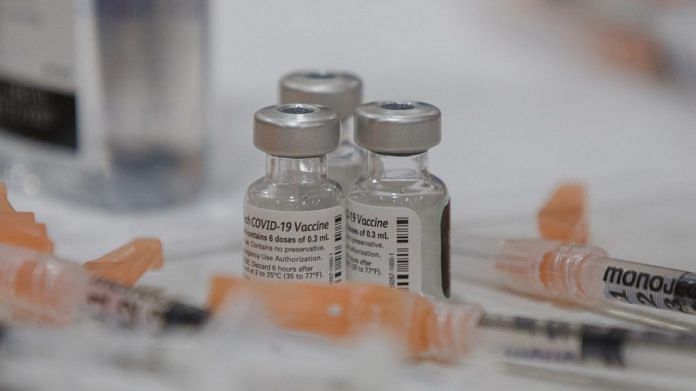New Delhi: People who have been fully vaccinated with BioNTech SE’s mRNA shot have about 10 times higher antibody concentrations than those who have received inactivated vaccines like China’s Sinovac, according to a new study published in The Lancet.
While measurement of antibodies may not be enough when it comes to mediating Covid-19 immunity, the researchers said “the difference in concentrations of neutralizing antibodies identified in our study could translate into substantial differences in vaccine effectiveness”.
The researchers mentioned that the study did not include data on other potential correlates of protection such as T cells or anitbody-dependent cellular cytotoxicity antibodies.
For the study, the team enrolled 1,442 healthcare workers from public and private hospitals and medical clinics in Hong Kong and collected blood samples from them during three intervals — before vaccination, after the first dose, and after the second dose.
Among the 93 fully vaccinated participants or healthcare workers in the trial, for whom they had complete data on antibody concentrations, 63 have received both doses of BioNTech vaccine while 30 others have been vaccinated with Sinovac.
Also read: Covid could leave half of those hospitalised with major organ complications, Lancet study says
What the study found
The researchers noted that the antibody concentrations for the 63 BioNTech recipients rose “substantially” after the first dose and again after the second, while the 30 Sinovac recipients showed “low” amounts of antibodies after their first shot, and “moderate” amounts after the second.
The average antibody levels of a subset of 12 BioNTech recipients, after the second dose, stood at 269, which was 10 times higher than those depicted by 12 participants in the Sinovac group, which stood at 27.
According to Hong Kong government data, as of 15 July, about 1,119,700 people received the Sinovac shot and about 1,611,800 people received the BioNTech vaccine.
The researchers also found that the BioNTech recipient with the lowest level of antibodies still had more antibodies than the person with the highest level of antibodies who took Sinovac.
The team also suggested the need to study “alternative strategies” to increase antibody concentrations and clinical protection in recipients of inactivated vaccines, including the administration of booster doses.
The finding adds to several other studies that have found mRNA vaccines to be more promising and more effective in protecting against Covid-19 and its variants than conventional vaccines, which are developed by more traditional methods such as inactivated shots.
Earlier, several reports have linked the ineffectiveness of Chinese vaccines (or its inability to provide adequate protection against the Covid) to the return of the virus in some countries.
According to a report in The New York Times, despite fully vaccinating 50 to 68 per cent of its populations, countries like Seychelles, Chile, Bahrain and Mongolia, who have relied on shots made by Chinese vaccine makers, are again seeing the worst Covid outbreaks. In May, when Seychelles imposed new restrictions due to the rise in infections, 57 per cent people in the country were given China’s Sinopharm and 43 per cent Covishield vaccine.
Also read: Lakhs of Indian kids may have missed routine vaccinations in 2020 due to Covid, WHO says



